#lazy internet slacktivists
Explore tagged Tumblr posts
Text
"On May 14, 2022, Payton Gendron, an 18-year-old white man, traveled 200 miles to a supermarket in a black neighborhood, where he shot and killed ten people, yelling racial slurs the whole time.
Gendron was a lone wolf killer. He had no formal ties to any organization. Nor did he know his victims. All he had were his illusions, including the illusion of race. Many of his illusions came from abstract concepts he learned online, which Gendron later admitted.
Other lone wolf killers have also spent an inordinate amount of time online. They gain insight into the world not by learning about life and people first-hand, but through an online study of images and symbols—through language. In the U.S., over half of the deadliest mass shootings in the last 100 years have occurred since 2014, when social media took off.
Gendron sprinkled his pre-murder manifesto with abstract words such as “fascism,” “capitalism,” “nihilism,” “hedonism,” and “individualism,” in an effort to explain his thinking. As a teenager, he said he was committed to “communism,” then to “authoritarianism,” and later to “populism.” Connor Sturgeon, another lone wolf killer (and knowledge worker) who shot and killed five people in 2023, filled his manifesto with vague and ill-defined words from popular psychology, including “self-esteem,” “negative self-image,” and “self-improvement.”
All these words can exist without being connected to anything that does exist. They have no well-defined cognitive content. They lend themselves to illusion because a person can project his or her own desires, hate, and fears onto them. They can mean whatever the person says they mean.
...
Urooj Rahman was a radicalized knowledge worker in her thirties. She threw a flaming gasoline-filled beer bottle into a New York City police car during the 2020 George Floyd riots. Tending toward the anarchic despite being a lawyer, she shouted, “I hope they burn everything down. Need to burn all police stations down and probably the courts too.”
Rahman spent much of her life amid abstract concepts. She spoke “the language of abolitionist Twitter,” one writer observed. She was “steeped in the language of social justice and racial politics.” Ill-defined terms such as “race,” “gender,” “LGBTQI,” and “environmentalism” seem to have shaped her crude perception of reality. Life for her became a theater in which her own little plot, built upon abstract words, was always being played.
The old American students who celebrated the purposeful killing of innocent Israeli civilians revealed a similar obsession with abstract words, constantly referring to phrases such as “colonialism,” “apartheid,” “humanitarian,” and “identity.” The words reflect the same creepy simplicity of mind that chills the blood."
The reason the establishment is so terrified of Aaron Bushnell's protest, is because they understand a point many of you seem to have missed
Aaron wasn't sending a message to the government (we know they don't care)
No, I think Aaron's message was meant for other service people like him. Because if the military refuses to participate in the genocide, it's over
And if you thought YOU were moved by Aaron's actions...
imagine how Aaron's unit is feeling right now
Mutinies have started for less
The exact moment every protest turns into a revolution, is when the army refuses to defend the establishment any longer.
And THAT was the message Aaron was sending out. How many units now are ready to reject orders? How low does their morale have to sink before they say 'enough!' How long until they stop pointing guns at the protestors outside, and run over and join them instead?
This is dangerous territory for a government that is hellbent on ignoring every crisis it creates
#see how ”you pushed me to do this“ ”You made me do this“#Who think#you guys are delusional#death cult behavior#death cult#lazy internet slacktivists#'The Establishment' isn't scared and doesn't care about that#They're just disturbed that delusional idiots like you are lionizing grand displays of self-harm and graphic violence#to feed your own delusions of grandeur#You are NO DIFFERENT from the lone wolf white supremacist mass shooters#who try to gain fame and infamy with public displays of graphic violence#who use grand violent public spectacles to “draw attention to” whatever imaginary online cause you attach yourself to#The young cishet white male white supremacists who drive over to black and latino neighborhoods to shoot colored people#In an effort to make “The Woke GovermentThe Establishment will see my violent display and finally realize that THEY are responsible--they FO#“They'll think 'oh no i must have crossed the line by MAKING a regular well-adjusted feel DRIVEN to such extremes--”#NO THEY DON'T#you're just sick in the head#you're a death cult who glorify public displays of mass violence#THAT'S why they're disturbed.#You're not shaking up the status quo#you're just airing your violent delusions out for all to see#You wanna help gaza?#Fucking GO THERE!!#Fucking GO THERE and pass out food and medical aid if it means that much to you#grand symbolic displays do fuck all#A guy burning himself on a sidewalk doesn't feed starving civilians who had their aid stolen by Hamas operatives#it just feeds your little romantic fantasy of being a scrappy rebel against a big org in an action movie
28K notes
·
View notes
Text
Activism and protest
If someone had come up to me 10 years ago and mentioned the word activist, the first thing that would have popped into my mind would be the image of an angry protestor holding a sign or a celebrity donating their riches to charity. However, as the digital landscape has evolved, so has the way we interact with the world around us and the way we can contribute to society. This digital shift has helped to “mobilise thousands of new supporters to a diverse range of causes” (Karatzogianni, 2016) and make activism something that’s accessible to all.
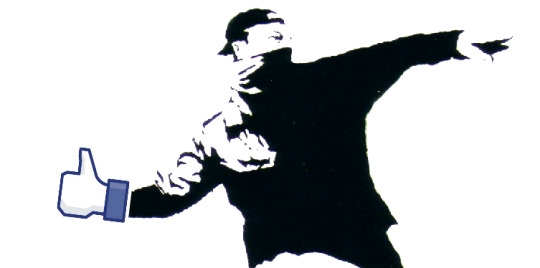
As digital citizens, we all play a very small part in a very large ecosystem of people, ideas, patterns and beliefs. In any community, whether it be digital or not, people who hold similar views and values are often drawn together so it makes sense for people that are passionate about the same thing to join forces online. As Bakardjieva et.al suggest, “nowadays, when citizens, activists and participants in social movements want to voice their views and define their political identities they increasingly do so in hybrid media environments”. Technology allows us to involve ourselves in things that might be happening on the opposite side of the world or things we would usually only hear about on the news and enables us to contribute to a wider variety of causes. However much of the criticism towards online activism focuses around “activists” being lazy and condemns users for not doing enough to actually solve any issues.
In his article Activism vs. Slacktivism, Dennis McCafferty defines slacktivists as “people who are happy to click a like button about a cause and may make other nominal, supportive gestures” but aren’t inspired to go out of their way to make a difference.
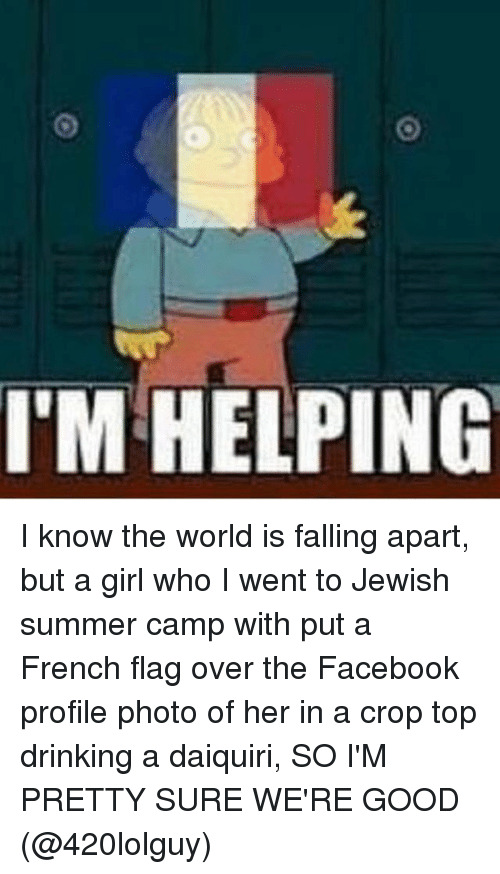
Slacktivism is definitely alive and thriving and it has become much easier for people to feel like they’re involved in a cause with the click of a button. Despite this, social media can be a powerful and important tool to support and promote activism in the digital age, and much of this criticism focuses too heavily on social media use on its own.
Just because there is a lower level of participation or interaction with a cause, this doesn’t mean that these small actions can’t have an impact or lead to widespread change. Social media in itself cant be held accountable for entire campaigns or movements, however it is a vital part of almost all current-day activism and is a valuable channel to support and promote causes in the digital age. It allows people to voice their views and define their political identities (Barkardjieva et.al., 2012) as well as being able to facilitate things such as rallies and protests on Facebook events to gain a wider audience outreach. Each small act of “slacktivism” helps raise awareness and may bring something to the attention of someone who is able to make a real difference.
Yes, slacktivism might be the “lazy” approach to activism but isn’t it better than doing nothing at all?
REFERENCES
Bakardjieva, M 2009, 'Subactivism: Lifeworld and Politics in the Age of the Internet', Information Society, retrieved from http://web.b.ebscohost.com.ezproxy.lib.swin.edu.au/ehost/detail/detail?vid=2&sid=bfad6349-ac30-4fa1-a575-069933155f86%40sessionmgr101&bdata=JnNpdGU9ZWhvc3QtbGl2ZSZzY29wZT1zaXRl#AN=36801133&db=a9h
Bakardjieva, M, Svensson, J & Skoric, M (2012) Digital Citizenship and Activism: Questions of Power and Participation Online in The eJournal of eDemocracy and Open Government, CC Creative Commons Licence, retrieved from http://people.ucalgary.ca/~bakardji/files/pubs/journals/JeDEM_Editorial.pdf
Budish, RH (2012) 'CLICK TO CHANGE: OPTIMISM DESPITE ONLINE ACTIVISM'S UNMET EXPECTATIONS', Emory International Law Review, vol. 26, no. 2, Retrieved from http://web.a.ebscohost.com.ezproxy.lib.swin.edu.au/ehost/pdfviewer/pdfviewer?vid=1&sid=516bc32b-ac5a-4b57-8b44-200e1eb2e07d%40sessionmgr4010
Karatzogianni, A (2016) Beyond hashtags: how a new wave of digital activists is changing society from The Conversation, University of Leicester, UK retrieved from https://theconversation.com/beyond-hashtags-how-a-new-wave-of-digital-activists-is-changing-society-57502
McCafferty, D (2011) Activism vs. Slacktivism in Communications of the ACM, Vol. 54 Issue 12, retrieved from http://web.a.ebscohost.com.ezproxy.lib.swin.edu.au/ehost/detail/detail?vid=0&sid=9e89532e-3109-4735-8ca0-c97b7595e6af%40sessionmgr4010&bdata=JnNpdGU9ZWhvc3QtbGl2ZSZzY29wZT1zaXRl#AN=69924567&db=iih
IMAGES
https://onsizzle.com/t/french-flag?since=1477386000%2C3136782
http://the-generation.net/the-slacktivism-of-generation-a-new-era-of-human-rights-activism/
5 notes
·
View notes
Text
No ‘Likes’... Just Donations
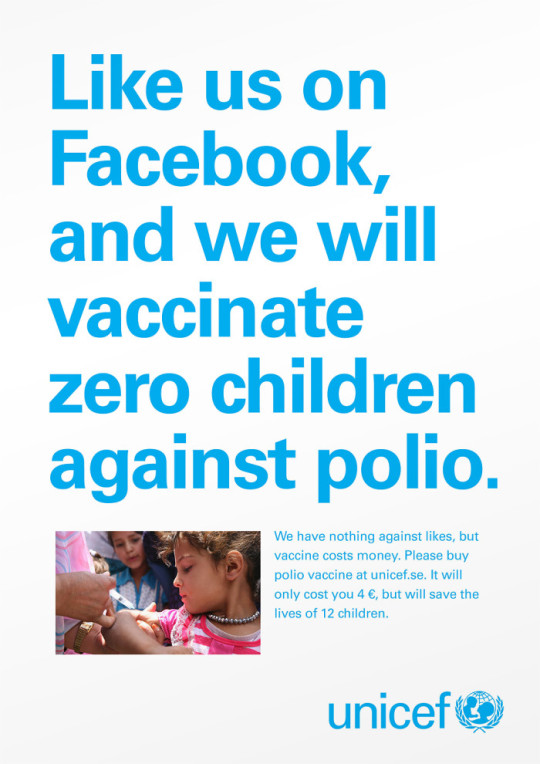
I am well aware of the term and meaning of Activism, but when I heard the word 'Slactivism' this week I honestly had no idea what it was. As a child my grandmother always referred to trousers as 'slacks' and that was the first thing that popped into my mind... how very wrong from the true meaning I was.
The internet can be criticised for making life too easy for us, and as a result of that, we as humans become lazier as technology advances. Is it really being lazy though, or is it effectively using the resources we have? Or could this just be a change in generations and how they do things?
What does it mean?
Let's look at the meaning first. The Oxford dictionary describes this as "The practice of supporting a political or social cause by means such as social media or online petitions" (Oxford University Press 2018).
Have you ever seen on Facebook, a charity page being shared and they have asked you to like their page? Or sign an online petition to make change happen? Maby you received an event notification, but couldn't attend so you simply liked the post. YUP, you're a slactivist. Myself, I frequently receive emails from change.org and if I believe in the cause I will follow the instructions to sign a petition.
This weeks reading, Youmans & York (2012, p. 317) explained the reasons that social media may contribute to a collective action
People not directly impacted, enables them to act out publicly
Information online can imply a likelihood of success
Increasing publicity to a global effect
Whilst also highlighting the mismatch and disconnect between social media platforms, and the needs of activist's that rely on social media as a public information infrastructure.
Over the years, Facebook has changed its terms of use so many times. What would happen if they implemented a monetised strategy which would then impede on this information being so freely available? That's something to think about.
Is it effective though?
Normally when you support a cause, that cause is asking for donations so that they can carry on their work and make a positive change. Studies by Lewis, Gray & Meierhenrich (2014, p. 2) have shown that when people 'like' a cause on Facebook, there is very little to no exchange in donations. It highlights a case study for http://savedarfur.org/home/ With over one million members liking the cause on Facebook, who collectively only donated $100,000.
Khazan (2013) also highlights a campaign from UNICEF Sweden where they released a campaign explaining they like 'Likes', but they need donations in order to save children's lives.
(Please refer to photo above)
On a more personal note, and I am sure not all of you will agree......
I am honestly exhausted with the word 'Donation' It seems to be everywhere I go... at the supermarket, department stores, and clothing chains. They're all trying to collect some sort of donation for a charity, and it makes me think is it just a tax deduction for them? or are they trying to appeal Ethical in their marketing efforts?
Personally, I don't donate to their charities, a few years ago when I learned what an NFP business was I was a little disheartened after doing some research and what it actually meant. I was very nieve in thinking it was volunteers out pounding the pavement collecting donations for World Vision and other organisations. Now I'm not saying all charities operate in a corrupt nontransparent way, but I do believe further disclosure of where donations are spent needs to be made more aware to the public... that's another debate for another day.
Are you a slactavist? Whats your view? Are charities asking too much of us at a time that's diluting their message?
Khazan, O 2013, UNICEF Tells Slacktivists: Give Money, Not Facebook Likes, The Atlantic, viewed 27 January 2018, <https://www.theatlantic.com/international/archive/2013/04/unicef-tells-slacktivists-give-money-not-facebook-likes/275429/>.
Lewis, K, Gray, K & Meierhenrich, J 2014, 'The Structure of Online Activism', Sociological Science, vol. 1, no. 1, pp. 1-9.
Oxford University Press 2018, Definition of slacktivism, Oxford Dictionary/Oxford University Press, viewed 28 January 2018, <https://en.oxforddictionaries.com/definition/slacktivism>.
Youmans, W, & York, J 2012, 'Social Media and the Activist Toolkit: User Agreements, Corporate Interests, and the Information Infrastructure of Modern Social Movements', Journal Of Communication, vol. 62, no. 2, pp. 315-329.
IMAGES
UFICEF Sweden 2013, 'UNISEF Poster, asking for donations, not likes' [image], on The Atlandic website, The Atlandic, viewed 28 January 2018, <https://www.theatlantic.com/international/archive/2013/04/unicef-tells-slacktivists-give-money-not-facebook-likes/275429/>.
7 notes
·
View notes
Text
The Internet and Political Change: A tool for social justice? Or a tool for outrage? Or a tool for apathy and slacktivism. #GretaThunberg, #MeToo, #OscarsSoWhite vs. Trump’s tweets
Recently it has become more and more trendy to care about politics and to speak up against injustice. While this is a positive thing, it has also caused many people to speak out online instead of in real life. Slacktivism is defined by the oxford dictionary as “the practice of supporting a political or social cause by means such as social media or online petitions, characterized as involving very little effort or commitment.” Using a hashtag to spread awareness, changing your profile picture in solidarity or advocating for your followers on social media to sign a petition are all actions which are categorized as Slacktivism. While these actions certainly support the cause and raise awareness, how much do they actually help in real life?
While social media has been at the forefront of many important political movements (#MeToo, #Blacklivesmatter etc.), it has also made it easy for people to portray themselves as “activists” without actually getting up off their couch. During the bushfires in Australia, millions of people posted about how tragic the event was, how they were sending their love blah blah blah. My guess is that most of those people did absolutely nothing to help the victims of the fires or to help put them out. More people probably posted about it than donated to relief funds, or that attended the climate rallies. It’s just too easy to be inactive. The critical concept that the form of the medium shapes the content applies here beautifully. The structure of social media allows and promotes slacktivism. Social media has invented so many easy ways to contribute without contributing too much. Simple change your profile picture in solidarity or share a picture that claims it’ll plant a tree for every thousand likes. Five seconds and you’re done. You can go back to watching Netflix, feeling good about yourself for contributing to the world. But in reality you haven’t done a whole lot. Change is made by long hours and dedication to a cause, not by liking a post.
While I believe that slacktivism has a mostly negative effect, the article Slacktivism: Legitimate Action Or Just Lazy Liking by Llona Lodewijckx argues that there are also great benefits. For example it helps to spread the word and raise awareness. Two very clear examples of how online activism actually helped causes in real life are #Blacklivesmatter and the Ice Bucket Challenge. The former raised thousands of dollars for ALS and the latter started a powerful movement against racism with multiple chapters in the States and in Canada. While slacktivists aren’t doing a lot, Lodewijckx argues that they are still doing something rather than nothing, which is half the battle. They are spreading awareness and hopefully educating themselves on important issues. This is the first step to making a real change. She states “slacktivism arguably serves as some kind of ‘gateway drug’ for people who are less inclined to participate in politics or public debate.” A point which I am hesitant to agree with. I believe for the more proactive among us, yes, it can promote real activism, but for many others it can also act as a sedative.
In conclusion, social media has given activists a powerful tool for social change. We can now reach more people in less time than ever before in history. We’ve never been in a better position to fight racism, sexism, climate change and other issues that need to be resolved. The world is at our fingertips, all we need to do is gather the courage to get up off our screens and onto our feet to fight for what we believe in.
0 notes
Text
Post #3: Is Digital Activism an Effective Medium for Change?
When I hear people speak of ‘activism’, I tend to firstly think about the arguably more obvious and physical examples such as rallies, organised protests, street marches, or strikes.

That being said, the internet (specifically social media) has also been highlighted as another method. Digital or cyber activism involves the use of these internet tools to promote certain ideas while gathering support at the same time (Al-Dosari 2014). However, putting digital activism on the same level or podium as traditional means of activism has certainly proven controversial; there are varied opinions regarding whether it is truly valuable in today’s society. Perhaps this stems from the debate over the concept of sociability existing on social network sites.
Before exploring both sides of the discussion, it would be best to quickly go back to the basics. According to Henrik Bang (2005), activism “expresses a collective enterprise for keeping the state accountable to their needs of civil society”. This also extends to other dominant powers such as mainstream media, specific corporations, academic institutions...you get the idea. Activism is essentially making an effort to promote (or impede) social, political, environmental or economical change. In that case, if we apply this to a digital sense then it can be quite clear that efforts to make societal improvements certainly do exist online as these sites already serve as venues for shared expression. The question is though, is this enough?
Arguments for: Those who do believe in online activism and its benefits to society tend to contend elements of community visibility, solidarity and mobilisation, or that it is “better than nothing” (Rintel 2013). Social media platforms are argued to play a vital role in expanding the reach through networks, and therefore assisting like-minded activists to come together and potentially take part in further action. Some believe there are little to no differences as to the specific platform used, though others claim otherwise. One analysis stated that for a revolution to occur, Facebook tend to be used to form groups and set the dates, Twitter produces the logistics and news dissemination, while Youtube shows the world. All together, they ultimately connect people to a cause (Gerbaudo 2012, p.3). In my opinion, I do agree that these networks are important and useful in terms of spreading ideas with a large reach, creating awareness, prolonging a social movements lifespan and starting important discussions between those that may otherwise never have met in ‘real’ life. It should be noted though that research from the University of Washington highlights the fact that digital activism does tend to work best when it is in conjunction with street-level organisation (Edwards, Howard & Joyce 2013). Effective digital activism also supposedly requires use of a number of social media tools as opposed to just tweeting alone for example.
Arguments against: I briefly spoke about the main issue with activism in my last post when I reflected on the statement that “the Revolution will not be tweeted” (Jericho 2012). This is based on the widespread view that activism requires real, offline connections as opposed to being built around weak ties that aren’t deep enough to generate any change. As noted by Rintel (2013), those skeptical about digital activism tend to base their reasoning on the idea of ‘slacktivism’ and that attention or awareness should not be treated the same as action.
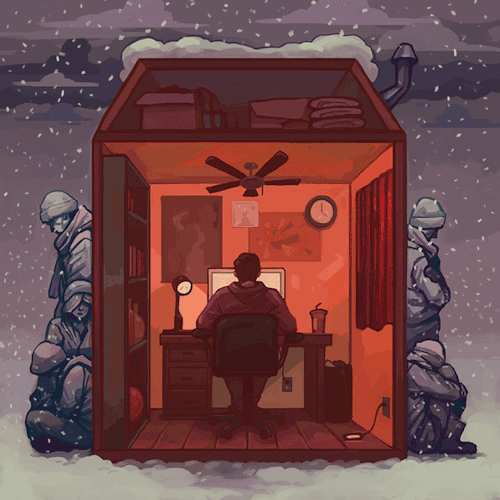
If this is the case then many of us have fallen victim to slacktivism, whether it be undertaking the ALS ice bucket challenge, sharing a video, liking a page, signing a petition, ‘supporting’ KONY 2012 or updating our Facebook profile picture to a certain filter overlay in order to support a certain cause such as marriage equality. These are all great examples of what is considered thoughtless or lazy and essentially too easy to be valuable. There is also hint of an altruistic undertone; for a moment we feel good about our contribution to ‘activism’, yet then simply move on with our lives and are unlikely to give it a second thought. Steven Mazie (2015) explains it as “a means to the end of social gain, rather than of social change”.
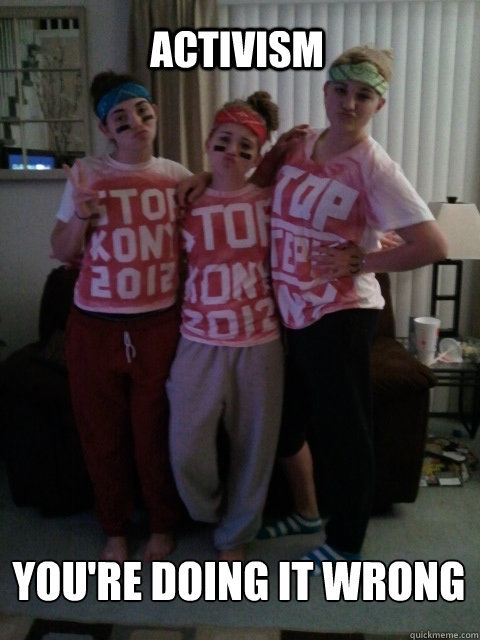
So yes, I do agree that there are elements of slacktivism online and I have certainly been guilty of it at times, however I think it would be unfair to generalise this as an entirety. In other words, online activists are not all slacktivists. There are countless examples of how digital activism has proved just as effective as what society would consider as traditional or ‘normal’ methods of advocation for change. Not only that, but even some of the common examples of what is though to be slacktivism have indeed led to some form of significant action despite what skeptics may think. For example, many online petitions have actually changed decisions by major corporations, for example policies related to survivors of sexual assault or local photography permit requirements (Earl 2016). One study regarding the 2011 Occupy movement and the 2013 Gexi Park protests actually found that those who created virtual content as opposed to being involved in the live protests were “at levels that [were] comparable to core participants” (Groetzinger 2015). There may also be a crossover, as it was also said that those who supported online movements are actually more likely to contribute to physical activism.
At the end of the day, social media did not create activism; this notion was around well before Web 2.0. It merely acts as an additional platform or tool that allows citizens to promote and gain awareness, and in some cases support protest and revolution. Perhaps by being caught up in what the ‘right’ way to protest is, maybe we end up missing the point entirely. Instead of focusing on the differences between forms of activism and creating a certain standard of who is a ‘real’ activist, maybe efforts should instead be simply trying to find ways to include everyone and therefore making use of all practices including social media. After all, changes in society start by engaging as many people as possible, and if social media can assist in that while potentially prolonging the lifespan then I don’t think it should be looked past at all.
See below for references.
References:
Al-Dosari, S 2014, Studying pros and cons of digital activism, Arab News, viewed 7 April 2017, <http://www.arabnews.com/news/569451>.
Bang, H 2005, ‘Among everyday makers and expert citizens’, in J Newman (ed), Remaking governance: Peoples, politics and the public sphere, Policy Press, Bristol, pp. 159-178.
Earl, J 2016, ‘‘Slacktivism’ that works: ‘Small changes’ matter’, The Conversation, viewed 8 April 2017, <http://theconversation.com/slacktivism-that-works-small-changes-matter-69271>.
Edwards, F, Howard, P & Joyce, M 2013, “Digital Activism and Non-Violent Conflict,” Digital Activism Research Project, Seattle, University of Washington, pp. 1-23.
Gerbaudo, P 2012, Tweets and the Streets, Pluto Press, London.
Groatzinger, K 2015, ‘Slacktivism is having a powerful real-world impact, new research shows’, Quartz, viewed 8 April 2017, <https://qz.com/570009/slacktivism-is-having-a-powerful-real-world-impact-new-research-shows/>.
Jericho, G. 2012 ‘How many votes are there on Twitter?’ in The rise of the Fifth Estate: social media and blogging in Australian politics, Scribe Publications Pty Ltd, Australia, EBL eBook Library, viewed 7 April 2017, pp 254 – 278.
Mazie, S 2015, ‘Three Big Problems With Facebook Activism’, Big Think, viewed 8 April 2017, <http://bigthink.com/praxis/facebook-is-fraying-not-saving-the-world>.
Rintel, S 2013, ‘‘Slacktivism’ vs ‘snarktivism’: how do you take your online activism?’, The Conversation, viewed 8 APril 2017, <http://theconversation.com/slacktivism-vs-snarktivism-how-do-you-take-your-online-activism-13180>.
2 notes
·
View notes
Text
Like and Share If You Want To Be An Activist But Truthfully You’re Too Lazy To Actually Make A Real-World Difference!
The past decade has seen a number of activist causes, with organisations, celebrities, and general Internet users worldwide contributing hashtags, photos and videos, and making personal sacrifices to support the latest trending issue. Don’t get me wrong; issues have definitely been positively attended to via social networks. Fundraisers like ‘The World’s Greatest Shave’ has clocked almost 40,000 hashtags on Instagram alone (Instagram 2018) with people sharing their stories, their bald scalps, the money that’s been raised, as well as posts encouraging others to jump in on the cause. The post itself isn’t necessarily saving lives, but the purpose behind the photos and videos, whether people are shaving their heads, donating money, even knitting beanies, illustrates that social media can prompt a form of effective social activism that is making a real world difference.
The Ice Bucket challenge in support of A.L.S research allowed “networks of individuals [who were] able to coalesce around a grievance and find symbols under which to organise.” (Signal & Biddle 2015, p. 289) Ordinary people became “soft leaders,” (Gerbaudo 2012, p. 5) in other words, users became influential. By tagging friends in the ice bucket challenge, “collective action [could be] unfold[ed].” (Gerbaudo 2012, p. 5) The popular sensation that swept across the world “brought in a staggering $115 million,” (Wolff-Mann 2015) which actually “helped scientists discover a new gene tied to A.L.S.” (Rogers 2016)
But then, there’s ‘slacktivism’. The name is pretty self-explanatory, and plenty of people are guilty of it, myself included. It refers to those annoying, up-themselves people that provide “superficial, minimal effort in support of causes.” (Gladwell 2010) Remember Kony 2012? What even happened to that? It seemed to boom overnight from my memory, and became this global phenomenon to “stop Kony,” (Abad-Santos 2012) the African warlord “responsible for massacres, mass rapes, and creating a legion of child soldiers.” (Shepherd 2013) The thirty minute video by Invisible Children encouraged the internet to spread the word, sign a pledge, buy a Kony 2012 action kit and donate to Invisible Children. (Invisible Children 2014) Though donating assisted in moving world leaders to take action against Kony’s army, Kony himself was not ‘stopped’ and “remains at large.” (The Associated Press 2017) There were also plenty of ‘slacktivist’ posts at the time that represented minimal effort to support a cause without providing any sacrifice (whether that’s represented through dedicating time, money, or continuously advocating, etc.) Below are examples of my ‘support’ for Kony 2012 that effectively provided minimal to zero results to the progression of the cause.


Similarly, there are also a number of Facebook pages that would post photos that, in itself, promoted slacktivism. ‘1 like = 1 prayer’ photos, ‘share this if you hate poverty’, etc. the below post is one I found particularly ridiculous.
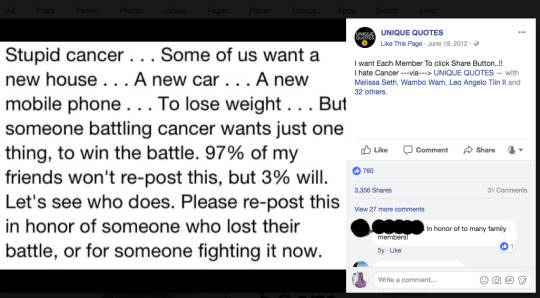
Would cancer victims really feel uplifted to see their family and friends share or like this post? Would it truly help their situation? Cure their cancer? Wouldn’t activist support be exemplified through donations and fundraisers to support research into the disease? Or visit the victims in hospital to prove their efforts in attempting to help cope? Liking or sharing a post on Facebook is merely convenient. Maybe thoughtful, but don’t expect the world to change.
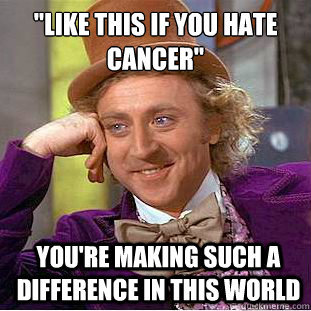
-------
References
Abad-Santos, A 2012, ‘The Problems with ‘Stop Kony’’, The Atlantic, 8 March, viewed 11 April 2018, < https://www.theatlantic.com/international/archive/2012/03/problem-stop-kony/330661/>.
Gerbaudo, P 2012, Tweets And The Streets – Social Media and Contemporary Activism, Pluto Press, London.
Glen, G 2017, ‘Who Needs a Donation When You Can Like, Share and Pray?’, Glen Green Dot Com, viewed 12 April 2018, < http://glengreen.com/who-needs-a-donation-when-you-can-like-share-and-pray/>.
Instagram 2018, #worldsgreatestshave, Instagram, viewed 9 April 2018, <https://www.instagram.com/explore/tags/worldsgreatestshave/>.
Invisible Children 2014, Kony 2012, Invisible Children, viewed 10 April 2018, <https://invisiblechildren.com/kony-2012/>.
Lafi Youmans, W & York, J 2012 ‘Social Media and Activists Toolkit’, Journal of Communication, pp 315-329.
quickmeme 2018, ‘Willy Wonka Meme Like This If You Hate Cancer’, “Like This If You Hate Cancer” You’re making such a difference in this world, quickmeme, viewed 12 April 2018, < http://www.quickmeme.com/meme/3omda5/page/1/>.
Rogers, K 2016, ‘The ‘Ice Bucket Challenge’ Helped Scientists Discover a New Gene Tied to A.L.S.’, The New York Times, 27 July, viewed 10 April 2018, < https://www.nytimes.com/2016/07/28/health/the-ice-bucket-challenge-helped-scientists-discover-a-new-gene-tied-to-als.html>.
Shepherd, T 2013, ‘Remember Kony 2012? Well, it’s 2013. What happened?’, news.com.au, 11 January, viewed 11 April 2018, < http://www.news.com.au/world/remember-kony-2012-well-its-2013-what-happened/news-story/a5de07eca7c15e69ff216b096b13d079>.
Signal, I & Biddle, E 2015, ‘Out Enduring Confusion About the Power of Digital Tools in Protest’, The Fibreculture Journal, no. 26, pp. 287 – 292.
The Associated Press 2017, ‘U.S. ends manhunt for African warlord Joseph Kony after top commanders killed or captured’, National Post, 20 April, viewed 10 April 2018, <http://nationalpost.com/news/world/u-s-ends-manhunt-for-african-warlord-joseph-kony-after-top-commanders-killed-or-captured>.
UNIQUE QUOTES 2012, ‘I hate Cancer’, I want each member to click Share button, Facebook, viewed 11 April 2018, < https://www.facebook.com/search/str/like+if+you+hate+cancer/photos-keyword?filters_rp_creation_time=%7B%22name%22%3A%22creation_time%22%2C%22args%22%3A%22%7B%5C%22start_year%5C%22%3A%5C%222012%5C%22%2C%5C%22end_year%5C%22%3A%5C%222012%5C%22%7D%22%7D>.
Wolff-Mann, E 2015, ‘Remember the Ice Bucket Challenge? Here’s What Happened To The Money’, Money, 21 August, viewed 11 April 2018, < http://time.com/money/4000583/ice-bucket-challenge-money-donations/>.
0 notes
Text
#slacktivist
The internet and social media has given us the ability to do virtually anything at the click of a button - and that includes political protesting. Pressing “like” on a post that supports a charity may make you feel like you’ve done your good deed for the day, but is it actually doing anything to contribute to the cause? How about retweeting #*current issue*, does that make a difference? Whilst there is no denying that social media has a large part to play in activism, the flip side of this - that is, the lazy side - cannot be ignored.
Slacktivism is defined by the Oxford Dictionary as “the practice of supporting a political or social cause by means such as social media or online petitions, characterized as involving very little effort or commitment”. Examples of slacktivism include tweeting a hashtag such as #BlackLivesMatter, participating in and sharing a challenge such as the ALS Ice Bucket Challenge, and adding a filter to your profile picture, like the 2017 pride filter Facebook introduced in support of Gay Marriage.
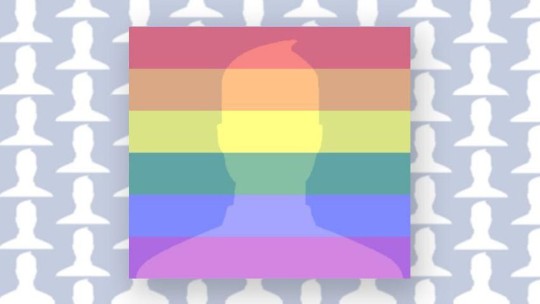
Whilst these examples definitely create awareness around an issue, it can be argued that they don’t really do anything to bring about change. A 2014 study focusing on the Facebook cause “Save Darfur” found that although the cause had nearly 1.2 million subscribers, the cause was only able to raise approximately $100,000 in three years. Even more shocking than this, it was found that 99.76% of members did not donate (Lewis 2014). Participating in this kind of passive activism , as the definition states, involves “very little effort or commitment”, which is reflected by issues such as lack of donations.
Slacktivism also raises another question - what are the motives behind people’s involvement in social media activism? Kristofferson (2013) argues that slacktivist actions are performed as “token” acts of support and are motivated by the desire to present oneself in a positive way. This means that the act of showing support for a cause has more to do with curating ones brand on social media, rather than actually supporting a cause. The issue with this is if activism is motivated by social appearances, then simply sharing something on social media achieves the individuals goal. If people no longer care about the issue itself, but rather care about looking like they care, how will activism be able to create change?
However, this is not to say that social media is completely powerless when it comes to activism. I would argue that social media is great way to spread the word about an issue, when it is used in conjunction with more traditional methods of protest such as marches, occupy movements and hard copy petitions. Social media can be used to inspire people into these physical actions, which in turn has the potential to create change.
References:
Carey, A 2015, ‘Empty Clicks: Why Online Activism is often Meaningless’, Elite Daily, 21 July, viewed 19/04/2018
Funnell, A 2017, ‘From slacktivism to 'feel-good' protests, activism is broken: Here's how to fix it’, ABC News, 25 October, viewed 19/04/2018
Kristofferson, K, White, K, Peloza, J 2014, ‘The Nature of Slacktivism: How the Social Observability of an Initial Act of Token Support Affects Subsequent Prosocial Action’ Journal of Consumer Research, Volume 40, Issue 6, pp 1149 – 1166.
Lewis, K Gray, K, Meierhenrichc, J 2014, ‘The Structure of Online Activism’, Sociological Science, Volume 1, pp 1 - 9
0 notes
Text
Am I a slacktivist?
Social and political activism has seen incredible change since the introduction of social media and ‘networked citizens’. While activism traditionally entailed activists physically meeting and engaging in protests, the Internet has given rise to web-based activism. Innovative new media technology such as social media apps; Instagram, Twitter and YouTube have provided a platform for people to express themselves. Networked societies are able to unleash the power of social media connection to engage in campaigns on subjects of their choosing, empowering them to ‘Cyspread the word’ (Deverell 2011), digitally.
Those concerned about a particular issue that don’t have the resources to participate in traditional activism are able to contribute to discussion through online platforms and forums and with an extraordinarily broad and global outreach. As Sieb (2012) explains, “The venues of mass communication become more diverse and pervasive, individual citizens become intellectually and politically empowered. They know more about what is going on around them and they use media tools to form communities of interest that enhance political activism”.
Albinsson (2011) comments on the rise of this new kind of activist labelling them ‘Slacktivists’. These participants are described as consumers who “care for social causes but only up to a certain point of engagement” (Albinsson 2011), acknowledging that they will sign an online petition, like the kind Change.org produces, yet not contribute, due to lack of resources or desire, to traditional routes of activism such as marches and picketing.
Change.org is an online platform that facilitates petitioning worldwide on an almost unlimited number of topics. It allows users from far reaches to contribute to discussion and, when successful, actuate change. Change.org boasts over 45 million users and petitions can be shared via a multitude of platforms with its co-founder, Benn Rattray stating, “(Change.org) can be the most influential social-change agent in the world” (Aronowitz 2013).
Though the name ‘slactktivist’ carries an irreverent tone, the ability to unite on a global scale with the click of a mouse is incredibly empowering. Personally, I am proud to be considered a ‘slacktivist’. For whatever reason that renders me unable to participate in a protest or march, I am still able to contribute to a cause I believe needs attention by reaching out to a website like Change.org or by posting in online forums. I have seen extraordinary action taken throughout the #metoo campaign and during the recent #australianmarraigeequality debate. Neither would have been possible to that effect without the aid of web based activism.

Reach Change.org, here.
Albinsson, P and Yasanthi Perera, B. (2011) ,"Putting the Roots Back in Grassroots: Consumer Activism Through Social Media", in NA - Advances in Consumer Research Volume 38, eds. Darren W. Dahl, Gita V. Johar, and Stijn M.J. van Osselaer, Duluth, MN : Association for Consumer Research.
Aronowitz, N. 2013, ‘Does Change.Org really change anything?’ Dame Magazine, Accessed 20.12.17 https://www.damemagazine.com/2013/11/18/does-changeorg-really-change-anything/
Deverell, S. 2011, ‘Why social media activism isn’t lazy.’ New Age Media Online, 24 August, Accessed 18 Dec. 2017 http://link.galegroup.com/apps/doc/A265210935/ITOF?u=swinburne1&sid=ITOF&xid=ff8cc917
Sieb, P. 2012, Real-Time Diplomacy: Politics and Power in the Social Media Era, Global Media Journal, Fall 2012, Accessed 18 Dec, http://www.globalmediajournal.com/open-access/realtime-diplomacy-politics-and-power-in-the-social-media-era.pdf
0 notes
Text
LGBTQ Community History and the Impact of Millennial Activism - Abby
This semester I’ve been thinking a lot about community history. With everything going on in our country and in our communities, I find myself realizing more and more that all of the whitewashed patriarchal heteronormative history I learned in my advanced placement classes is scrubbed of all recognition of difference. My limited learning of our history had led me to believe I had reached an impasse, a place where the knowledge I have and the knowledge I have yet to acquire meet at a seam I hadn’t sewn up.
Last semester in my LGBTQ Mental Health and Well-Being course, we read a speech given by lesbian historian Maria Helena Dolan in 2004 titled “You Can’t Be a People Unless You Have a History” (1). This was the first time I had really learned anything in depth about the Mattachine Society and the Daughters of Biitis, other than a passing mention on an LGBTQ history timeline. She discusses not only the history of the movement, but also about what we can learn from the activism of the generations before us.
After an oral history touching on the activism arising during the AIDS epidemic and stating that, “Progress only happens when people step up; when we tell the truth about our lives; when we feel that our lives have inherent value and meaning,” her timeline is based in civil rights, not human rights. She ends the speech asking that we fight for marriage equality and the visibility of pride, with the only mention of bisexual and “trangendered” rights in an acronym, and her list of activists and organizations is overwhelmingly white. As Dolan says, “Queer history didn’t start in 1969 with Stonewall,” but her history is still framed within a context of whiteness and homonormativity.
Sarah Prager, creator of the LGBTQ history app “Quist,” believes that the idea that LGBTQ youth don’t care about their history is a myth, but rather, that they lack to opportunities and access to learn about LGBTQ history, or what she refers to as “quistory”(2). In October of 2014, she and her staff at Quist launched a campaign called #QuistoryMatters on Tumblr, Twitter, and Facebook, asking for commenters to list reasons why LGBTQ history mattered to them. In the initial 11 reasons they chose to highlight, they generalize activism and the movement, but the responses they received are much more intersectionally focused. Comments include statements about why LGBTQ history is important to them such as “Because queer PoC kids should be taught that queer excellence has never and will never be limited to white people,” and “to know that behind me is an incredibly strong and proud history of trans people.” One commenter even specifically notes, “ Because the leading UK LGB charity is called Stonewall & is only just now thinking about Trans people.”
There is a tendency for older generations (the baby boomer generation in particular), to paint millennials as lazy and lackadaisical about the world around us, and as “slacktivists” for using the Internet as a place for resistance and revolution, and tell us that our “identity politics” are solely divisive. According to one study by GLAAD, our generation is “the queerest generation the planet has ever seen,” with 20% of people ages 18-34 identifying as LGBTQ (3), and according to Pew Research Center, the most racially diverse generation in recorded American history (4). The millennial generation now outnumbers baby boomers, and 24 million of us voted in the last election. Our most recent presidential election was a wake up call for so many people in this country, and a recent poll showed that 60% of millennials feel that the presidential election led them to be more politically involved than before.
But none of this means anything if we aren’t doing the groundwork and building on the history of those who came before us. We have been told “Those who cannot remember the past are condemned to repeat it” (George Santayana), and our history shows that we have put white LG movements for civil rights at the forefront, while transgender folks and people of color are denied their human rights to safety, shelter, and the “equal protection under the law” we so often preach. We have to recognize that the meaning of community has to include recognition of identity, and that self-care must also be accompanied by community-care. In our fight for equality we must not lose sight of the fight for equity.
References
(1) Dolan, M. H., & Project, F. A. (n.d.). You Can't Be a People Unless You Have a History. Retrieved May 2017, from http://www.thebody.com/content/art32194.html
(2) T. (2014, October 22). 22 Reasons Queer History Is Important. Retrieved May 2017, from http://www.advocate.com/commentary/2014/10/22/op-ed-22-reasons-queer-history-important
(3) Valens, A. (2017, March 31). Study reveals millennials are the gayest generation yet. Retrieved May 2017, from https://www.dailydot.com/irl/millennials-lgbtq-glaad-study/
(4) Millennials in Adulthood. (2014, March 06). Retrieved May, 2017, from http://www.pewsocialtrends.org/2014/03/07/millennials-in-adulthood/
0 notes